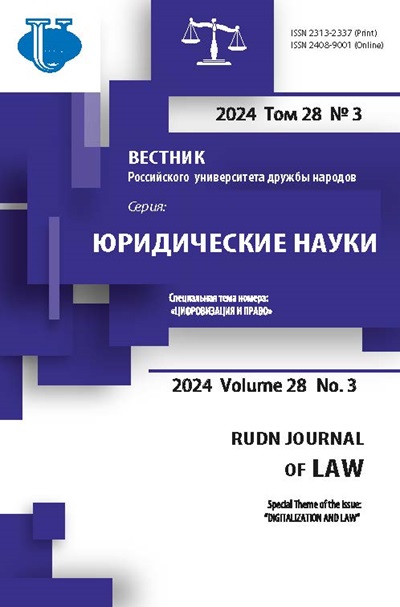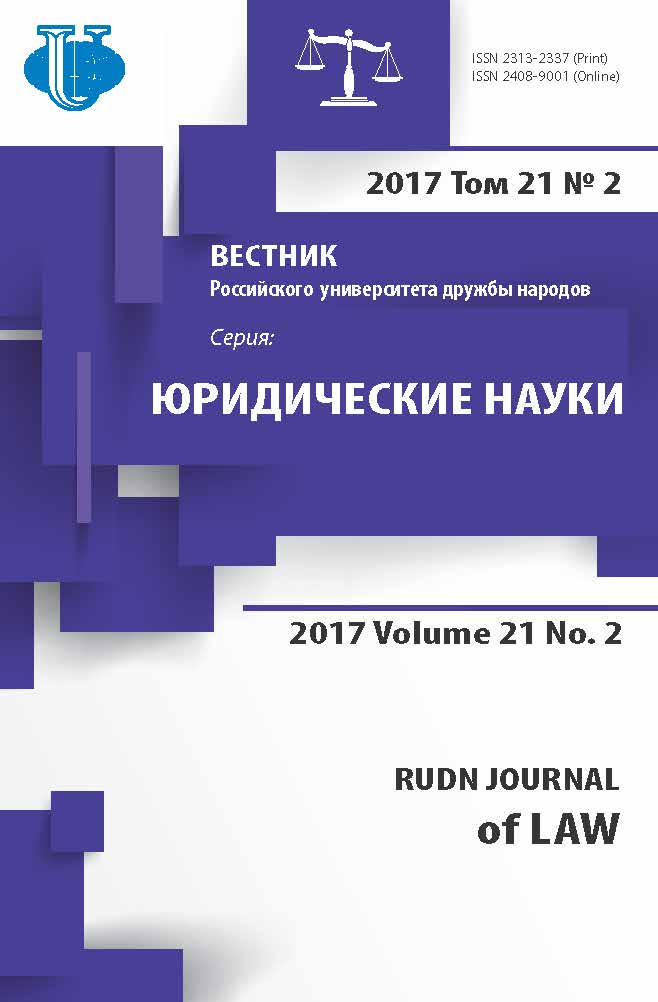Criteria of Justiciability in Abkhazian Customary Law
- Authors: Kamkiya F.G1
-
Affiliations:
- Sochi Institute (branch) of People's Friendship University
- Issue: Vol 21, No 2 (2017)
- Pages: 218-234
- Section: Articles
- URL: https://journals.rudn.ru/law/article/view/16322
- DOI: https://doi.org/10.22363/2313-2337-2017-21-2-218-234
Cite item
Full Text
Abstract
Analysis of customary law in different countries enables to see cultural context of law and by that it gives the opportunity to define character of national legal system. Different peoples’ customary rules of law are formed as a result of long-term accumulation of legal regulation experience. Value of customary law is that it was established free from some political and ideological conjuncture. Research of Abkhazian adats leads to conclusion that social order depends on balance of regulative processes consisting of external organisation by public institute of the state and internal self-organisation of the socium. The author analyses Abkhazian customary law that still plays important role in development dynamics of the social system because in customary legal consciousness the principle «that way was usual (always) in the past» is a necessary condition for regulation of important things. It is the custom that helps to juridify social relations because it has authority of rule of conduct approved by the time. That is why the author suggests paying attention to criteria of “justiciability” delimiting legal and non-legal in social regulation. She defines a list of attributes differentiating the custom without legal significance and customary rules of law that fulfill legal criteria. From this point of view Abkhazian customary law: 1) is normative one; 2) is statutory one; 3) is rational one, it provides integration (i.e. oriented to interests of bigger social entire); 4) has an attribute of goal-setting; 5) regulates the most important things; 6) is processual one; 7) is provided with sanctions and provides contribution. The author resumes modern Abkhazian positive law itself is unable to meet the challenges of legal regulation and establish the legal order. It is necessary to use the opportunities of customary legal juridification of social relations because in modern Abkhazia it can provide development of legal system by fortifying state legal institutes’ credibility.
About the authors
Fatima G Kamkiya
Sochi Institute (branch) of People's Friendship University
Author for correspondence.
Email: jurfak-sfrudn@yandex.ru
Faculty of Law
32, Kuibyshev st., Sochi, Russia, 354348References
- Nemytina MV. Situation in the Russian Science of Law: Are there Basic Concepts? RUDN Journal of Law. 2016;(2):20‒35. (In Russian)
- Arkhipov S. Anthropological Theory of Law. Electronic supplement to «Russian Juridical Journal». 2016;(5):5–13. Available from: http://electronic.ruzh.org/?q=ru/system/files/ %D0%90%D1%80%D1%85%D0%B8%D0%BF%D0%BE%D0%B2_0.pdf. (In Russian)
- Kantorowicz H. The Definition of Law. Cambridge: Cambridge University Press; 1958. 112 p. (In Russian)
- Friedman LM. American Law: An Introduction. New York: Norton; 1984. xii, 362 p. [Rus.ed. Friedman LM. Vvedenie v amerikanskoe pravo. Moscow: Izdatel'skaya gruppa “Progress”; 1992. 286 p.].
- Carbonnier J. Sociologie juridique. Paris: Librairie Armand Colin; 1972. 320 p. (In French). [Rus. ed. Carbonnier J. Yuridicheskaya sotsiologiya [Juridical Sociology] Moscow: Progress; 1986. 352 p.].
- Isaev NA, Chestnov IL, editors. Sotsiokul'turnaya antropologiya prava [Socio-cultural anthropology of law]. Saint-Petersburg: «Alef-Press»; 2015. 840 p. (In Russian)
- Mal'tsev GV. Sotsial'nye osnovaniya prava [Social Grounds of Law]. Moscow: INFRA-M; 2013. 800 p. (In Russian)
- Konovalova AS. Obychnoe pravo v rossiiskoi pravoi zhizni. Avtoreferat diss. [Customary law in the Russian legal life. Diss. abstract]. Moscow; 2005. 26 p. (In Russian)
- Khvostov VM. Istoriya rimskogo prava [History of Roman Law]. Moscow: Tipografiya tovarishchestva I.D. Sytina; 1908. 463 р. (In Russian)
- Malinowski B. Magic, Science and Religion and Other Essays. Boston, Massachusetts: Beacon Press; 1948. 327 p. [Rus. ed. Malinowski B. Magiya, nauka i religiya. Moscow: ''Refl-buk''; 1998. 304 p.].
- Marchenko MN, editor. Obshchaya teoriya gosudarstva i prava [General theory of state and law]. Vol. 2. Moscow: «Zertsalo» Publ; 1998. 622 p. (In Russian)
- Chestnov IL. Postklassicheskaya teoriya prava [Postclassical theory of law]. Saint-Petersburg: Izdatel'skii dom «Alef-Press»; 2012. 650 p. (In Russian)
- Polyakov AV. Obshchaya teoriya prava [General Theory of Law]. Saint-Petersburg: Yuridicheskii tsentr Press; 2001. 642 p. (In Russian)
- Alekseev SS. Pravo: Azbuka ‒ teoriya ‒ filosofiya: Opyt kompleksnogo issledovaniya [Law: Alphabet-Theory-Philosophy: The Experience of Comprehensive Research]. Moscow: Statut; 1999. 711 p. (In Russian)
- Erasov BS. Sotsial'naya kul'turologiya [The Social Culturology]. Part 1. Moscow: AO «Aspekt Press»; 1994. 384 p. (In Russian)
- Sukhanov IV. Obychai, traditsii i preemstvennost' pokolenii [Customs, traditions and continuity of generations]. Moscow: Politizdat; 1976. 216 p. (In Russian)
- Filosofskii entsiklopedicheskii slovar' [Philosophical Encyclopedic Dictionary]. Moscow: INFRA-M; 2004. 576 p. (In Russian)
- Shershenevich GF. Obshchaya teoriya prava [General Theory of Law]. Moscow: Izdanie brat'ev Bashmakovykh; 1911. 698 p. (In Russian)
- Trubetskoi EN. Lektsii po entsiklopedii prava [Lectures of Encyclopaedia of Law]. Moscow: Tovarishchestvo tipografii A.I. Mamontova; 1917. 227 p. (In Russian)
- Lloid D. The Idea of Law. Harmondsworth: Penguin; 1974. 368 p. [Rus. ed. Lloid D. Ideya prava. Moscow: YuGONA; 2002. 416 p.].
- Mal'tsev GV, Shapsugov DYu, editors. Obychnoe pravo v Rossii: problemy teorii, istorii i praktiki [Customary law in Russia: problems of theory, history and practice]. Rostov-on-Don: SKAGS Publ.; 1999. 368 p. (In Russian)
- Kharaniya VL. Slovar' yuridicheskikh terminov (russko-abkhazskii, abkhazsko-russkii) [Dictionary of legal terms (Russian-Abkhazian, Abkhaz-Russian)]. Suxum: Alashara; 2002. 158 p.
- Berman HJ. Law and Revolution: The Formation of the Western Legal Tradition. Cambridge, Mass.: Harvard University Press; 1983. x, 657 p. [Rus. ed. Berman HJ. Zapadnaya traditsiya prava: epokha formirovaniya. Moscow: MGU Publ., Norma; 1998. 624 p.].
- Supataev MA. O ponimanii prava [About Understanding of Law]. In: Novikova NI, Tishkov VA, editors. Yuridicheskaya antropologiya. Zakon i zhizn' [Legal anthropology. Law and Life]. Moscow: Izdatel'skii Dom «Strategiya»; 2000. p. 45‒50. (In Russian)
- Grafskij VG. Main conceptions of law and state in modern Russia (On the «Round Table» materials in the Center of Theory and History of Law and State of the Institute of State and Law of the Russian Academy of Sciences. The Journal «State and Law». 2003;(5):5‒33. (In Russian)
- Malakhov VP. Filosofiya prava [Philosophy of Law]. Moscow, Ekaterinburg: Akademicheskii proekt, Delovaya kniga; 2002. 447 p. (In Russian)
















